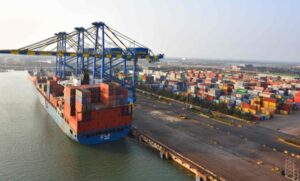Coastal Shipping integration with Inland Waterways
India’s Cabinet has approved the Coastal Shipping Bill, 2024 designed to eliminate the requirement for Indian-flagged vessels to acquire a general trading licence to operate in coastal waters causing shares of Shipping Corporation of India to soar. The background of the bill is the demand of Indian shipowners for revocation of three orders passed in the year 2018 which provided exemptions for foreign-flagged vessels disadvantaging domestic vessels .To provide a level playing field the Directorate General of Shipping has proposed to revoke three orders which allowed foreign-flagged vessels chartered by foreign entities to engage in coastal trade for specific commodities, such as EXIM trans-shipment containers, empty containers, agricultural products and fertilisers without a licence from the regulator.The three orders in question had allegedly led to stagnation in Indian-flagged container shipping .India views coastal shipping as a strategic area to spur its domestic maritime economy and the proposed law has the objective of bringing about procedural ease for provisions related to coastal shipping.In the proposed bill licensing conditions for foreign ships have been made statutory while at the same time incorporating statutory imposition of different licence conditions as to indigenous build or staffing of crew on foreign vessels engaged in coastal trade to protect and provide impetus to the domestic coastal shipping economy. The legislation has been carved out of Part 14 of the Merchant Shipping Act, 1958 . Conditions on staffing of crew for foreign vessels are likely to allow the government to enforce a minimum number of Indian seafarers on all such coastal vessels. Significantly the proposed legislation will permit coastal vessels to be operated in inland waterways thereby integrating inland waterway shipments with coastal shipping, creation of a coastal shipping database, benefit Indian ship owners and non-vessel operating common carriers, cargo owners, Indian seafarers & shipyards, move cargo transportation from road and rail to ships to ease congestion on the national logistic arteries.
 Credit /Source; Splash Krishnapatnam-Port
Credit /Source; Splash Krishnapatnam-Port
Criticism of Bill
Critics of the proposed legislation insist that the bill be supplemented with reliefs in tax provisions entailing cash flow concerns for domestic vessel owners and operators. On account of fiscal imbalances the operational and capital costs for Indian-flagged vessels are relatively higher resulting in increased operational expenses compared to foreign shipping competitors and Indian operators claim that they have lost container market share to foreign carriers for goods transportation.
By Maritime Analyst
Source/Credit ;
https://www.maritimegateway.com/cabinet-gives-green-light-to-coastal-shipping-bill-2024/
https://splash247.com/new-indian-coastal-shipping-bill-designed-to-strip-red-tape/

Leave A Comment